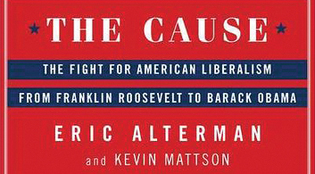 loading
loading
Arts & CultureLeft in the lurchBook review Alyssa Rosenberg '06 is the culture blogger for Think Progress and a correspondent for the Atlantic.  View full image
After the Occupy Wall Street movement recast the conversation about income inequality in America last fall, it slid into a period of uncertain dormancy this winter. Similarly, Barack Obama, after riding into office on the hope of transformational leadership, has seen his presidency bog down in political gamesmanship. It should be the perfect time, then, for The Cause, a new book that promises to tell the story of American liberalism through the stories of the movement's leaders, from FDR through today. But although the authors, CUNY Graduate School of Journalism professor Eric Alterman '86MA and Ohio University history professor Kevin Mattson, whisk readers through the familiar whistle-stops of liberalism—Harry Truman's surprise reelection, Adlai Stevenson's failed campaigns, Jesse Jackson's derailment in "Hymietown"—The Cause shares a weakness with the movement it chronicles. In trying to be many things to many people, the book, like the cause itself, struggles to maintain a consistent vision and a cogent line of reasoning. The book's biggest problem is a lack of structure. Alterman and Mattson could have taken many routes: picking a personality to anchor each of the book's 18 chapters; telling a chronological story subdivided by decade or political epoch; or stating a set of themes and choosing personalities in government, movements, and the arts to illustrate them. Instead we get a Who's Who of the movement that trivializes the participants' significance. Black leaders and activists—Ralph Ellison, W. E. B. DuBois, Richard Wright, Thurgood Marshall, Martin Luther King Jr., Bayard Rustin, A. Philip Randolph, and more—each make cameo appearances in a single breathless 13-page chapter called "We Shall Overcome." In the chapter "In the Darkness at the Edge of Town," The Cause pivots from Gloria Steinem to Silent Spring author Rachel Carson in a single paragraph, on the grounds that "like feminism, America's burgeoning environmental movement had little to do with the traditional economic or racial justice issues that had framed liberalism in the past." This superficial discussion of two seminal figures and the movements they helped create ignores what should have been a critical question for The Cause: Given that Americans face very different barriers to achieving economic and social justice, can liberalism meet their individual needs while fostering the sense that we're all in this together? When the authors do focus on the larger issue of building a movement, they are effective—as in their perceptive analysis of the political acumen of Harvey Milk, the gay San Francisco supervisor assassinated by a fellow board member. Milk was a master politician, who identified points of common interest in seemingly disparate special interest groups—the teachers' union, gay rights groups, and libertarians—to defeat Proposition Six, a ballot initiative that sought to ban homosexuals or anyone who supported gay rights from teaching in the California public schools. More often, though, the authors are content with scattershot name dropping and fuzzy generalizations: Sidney Poitier in Guess Who's Coming to Dinner? and refried stories about Harry Truman's haberdashery. The discussions of foreign policy are never tied to liberalism's core tenets. The Cause is at its best in its deft articulation of the inseparability of liberalism's strengths and weaknesses. The strongest section of the book comes in its discussion of Franklin Delano Roosevelt's presidency. Alterman and Mattson argue that the central contribution of Roosevelt's presidency, one that has guided liberalism ever since, was his decision that "no longer would freedom be defined simply as protection from or against the abusive powers of government": rather, he "sought to provide 'positive' freedoms as well." But even as FDR changed Americans' conception of the role of government, he failed to define "the boundaries of benevolent government intervention in the economy or individuals' lives." Thus, the authors write, Roosevelt's formulation gave liberals the tools to bind interest groups close to the movement by intervening on their behalf. But it also meant that when resources were limited or interest groups were in conflict, liberalism's leaders had to make difficult choices among their constituencies. The post-FDR presidents who had the greatest impact were those who avoided, eliminated, or inverted that choice entirely. John F. Kennedy, in his famous inaugural address ("Ask not what your country can do for you") refocused citizens' attention away from government's obligations to them. JFK made it clear, the authors write, that "there would be no declarations of war against 'economic royalty,' as FDR had declared; instead Kennedy proclaimed a state of affairs that might have been fairly dubbed 'peace in our time.'" Alterman and Mattson suggest that under Roosevelt, "liberalism became a political movement focused on improving the lives of working people and those who needed a helping hand from government." By the time Obama was elected president, liberalism had evolved into "primarily a movement designed to increase social and cultural freedoms (such as gay marriage) for those who could afford to enjoy them." The challenge for liberals posed by this paradigm shift, the writers suggest, is to craft a language that unifies economic and social issues into a forceful and coherent political movement. But liberals have failed to communicate that what appear to be social issues often cut to the core of economic concerns. Women who want health insurance to buy contraceptives may be thinking as much about staying at work as the right to choose. Gay couples that want to get married may need tax breaks as much as societal validation. If liberals are to regain their political and electoral mojo, they must convince voters that they're not pursuing a social-policy agenda at the expense of an economic one, the writers argue. Liberalism isn't a choice between one set of causes and another.
The comment period has expired.
|
|